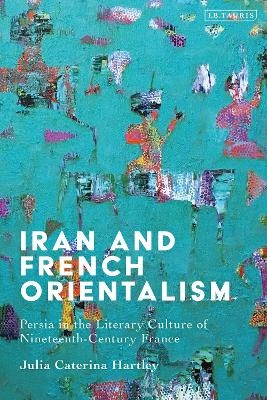
Iran and French Orientalism
I.B. Tauris (Verlag)
978-0-7556-4563-3 (ISBN)
- Noch nicht erschienen (ca. Juni 2025)
- Versandkostenfrei
- Auch auf Rechnung
- Artikel merken
Julia Hartley is a Lecturer in Comparative Literature at the University of Glasgow. She was previously Laming Fellow at the Queen’s College Oxford and Edward W. Said Visiting Fellow at Columbia University. She is the author of Reading Dante and Proust by Analogy (2019) and peer-reviewed articles in Iranian Studies and Nineteenth-Century French Studies.
Introduction
Iran in Nineteenth-Century France: Competing Narratives
Iran and Orientalism
Beyond the Paradigm of Difference
The Politics of Genre
Chapter 1: Poetry
Translation and Poetic Innovation
From Paris to ‘Persia’ and Back Again (Hugo, Théophile Gautier, Noailles)
Persian Poems Made in France (Renaud, Lahor/Cazalis)
Intertextuality and Universalism: The Case of ‘Les Roses de Saadi’ (Desbordes-Valmore)
Conclusion
Chapter 2: History and Historical Fiction
Rewriting Human History
‘Nos parents, les Aryas’ (Arthur de Gobineau, Ernest Renan, Jules Michelet)
The Persian Alexander: Hybridity and Queer (Anti-)Imperialism (Judith Gautier)
Ancient History? Iran as Mirror for French Feminism (Jane Dieulafoy)
Conclusion
Chapter 3: Travel-Writing
‘Tout chemin ne conduit pas en Perse’
Defining the Persians
Among Women: Scenes from the Harem
Understanding Shiism
‘Esfahan, Nesf-e Jahan’
Remembering ‘the Great of the Earth’
Plagued by the West
Books versus Reality
Conclusion
Chapter 4: Performing Arts
Orientalism and the Stage
A Tale of Two Peris : Iran, the Imaginary Orient, and Ballet (Théophile Gautier, Paul Dukas)
Of Poets, Prophets, and Kings: French Opera’s love affair with Iranian men (Lalla Roukh, Le Mage, and Thamara)
A Puppet Play about Omar Khayyam (Maurice Bouchor)
Rebuilding Susa: Jane Dieulafoy and Camille Saint-Saëns’s ‘Parysatis’ (1902)
Conclusion
Conclusion
| Erscheinungsdatum | 06.12.2023 |
|---|---|
| Sprache | englisch |
| Maße | 156 x 234 mm |
| Themenwelt | Geisteswissenschaften ► Geschichte ► Regional- / Ländergeschichte |
| Geisteswissenschaften ► Sprach- / Literaturwissenschaft ► Anglistik / Amerikanistik | |
| Geisteswissenschaften ► Sprach- / Literaturwissenschaft ► Literaturgeschichte | |
| Geisteswissenschaften ► Sprach- / Literaturwissenschaft ► Literaturwissenschaft | |
| ISBN-10 | 0-7556-4563-4 / 0755645634 |
| ISBN-13 | 978-0-7556-4563-3 / 9780755645633 |
| Zustand | Neuware |
| Informationen gemäß Produktsicherheitsverordnung (GPSR) | |
| Haben Sie eine Frage zum Produkt? |
aus dem Bereich


